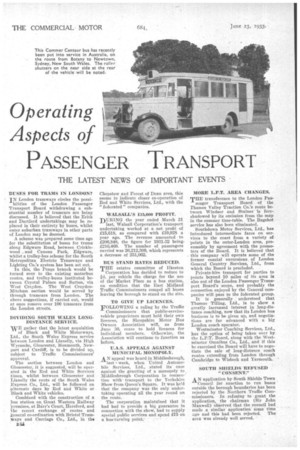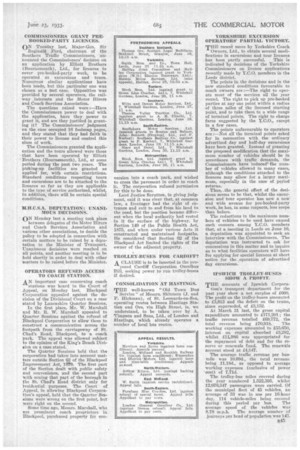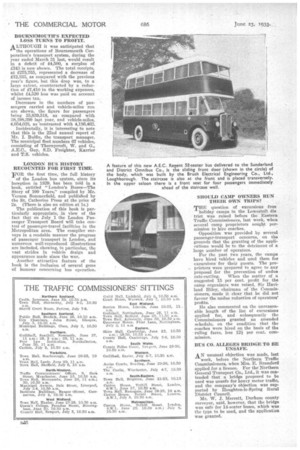Operating Aspects of • PASSENGER TRANSPORT
Page 58

Page 59

Page 60

If you've noticed an error in this article please click here to report it so we can fix it.
THE LATEST NEWS OF IMPORTANT EVENTS
BUSES FOR TRAMS IN LONDON?
IN London tramways circles the possi bilities of the London Passenger Transport Board withdrawing a substantial number of tramcars are being discussed. It is believed that the Erith and Dartford undertakings may be replaced in their entirety by buses, whilst outer suburban tramways in other parts of London may be doomed.
A scheme was prepared some time ago for the substitution of buses for trams along Edgware Road, between Cricklewood and Canons Park, Edgware, whilst a trolley-bus scheme for the South Metropolitan Electric Tramways and Lighting Co.'s system has been set out.
In this, the Penge branch would be turned over to the existing motorbus routes, and trolley-buses instituted between Crystal Palace and Sutton, via West Croydon. The West CroydonMitcham section would be served by through tramcars from London. The above suggestions, if carried out, would at once remove over 100 tramcars from the London streets.
DIVIDING SOUTH WALES LONGDISTANCE SERVICE.
WE gather that the latest acquisition
of Black and White Motorways, Ltd., the South Wales Express service between London and Llanelly, via High Wycombe, Gloucester, Monmouth, Newport and Cardiff, is to be divided up, subject to Traffic Commissieners' approval.
The section between London and Gloucester, it is suggested, will be operated in the Red and White Services times, whilst between Gloucester and Liamlly the route of the South Wales Express Co., Ltd., will be followed on tdternate days by Red and White or Black and White vehicles.
Combined with the construction of a bus station on Great Western Railway -Iremises, at Blirr's Court, Hereford, and the recent exchange of routes and eneral co-ordination with Bristol Tram:Ways and Carriage Co., Ltd., in the
Chepstow and Forest of Dean area, this seems to indicate closer co-operation of Red and White Services, Ltd., with the " federated " companies.
WALSALL'S £15,600 PROFIT. DURING the year ended March 31
last, Walsall Corporation's transport undertaking worked at a net profit of £15,618, as compared with £19,928 a year ago. The revenue amounted to £206,848, the figure for 1931-32 being. £216,469. The number of passengers Carried was 26,212,309, which represents a decrease of 251,062.
BUS STAND RATES REDUCED. THE estates committee of Ilkeston Corporation has decided to reduce to Id. per vehicle the charge for the use of the Market Place as a bus station, on condition that the East Midland Traffic Commissioners compel all buses leaving the borough to stand on the site.
TO GIVE UP LICENCES. FOLLOWING a ruling by the Traffic Commissioners that public-servicevehicle proprietors must hold their own licences, the Shropshire Motor Bus Owners Association will, as from June 30, cease to hold licences for individual members. Otherwise, the Association will continue • to function as before.
U.A.S. APPEALS AGAINST MUNICIPAL MONOPOLY.
AN appeal was heard in Middlesbrough, last week, when United Automobile Services, Ltd., stated its case against the granting of a monopoly to , Middlesbrough Corporation in connection withtransport to the Yorkshire Show from Queen's Square. It was held that the company was the only under? taking operating all the year round on the route.
The corporation maintained that it bad had to provide a big guarantee in connection with the show, bad to supply special public services and spend 175 on a bus-turning point.• MORE L.P.T. AREA CHANGES.
THE transference to the London Pas
senger Transport Board of the Thames Valley Traction Co.'s route between Windsor and Staines' is foreshadowed by its omission from the map in the summer time-table. The Bagshot service has also been eliminated.
Southdown Motor Services, Ltd., has introduced intermediate fares on services to the coast from a variety of points in the outer-London area, presumably by agreement with the promoters of the Board. It is believed that this company will operate some of the former coastal excursions of London General Country Services, Ltd., from which the Board is precluded.
Private-hire transport for parties to points beyond 10 miles of its area is also out of the London Passenger Transport Board's scope, and probably the connection enjoyed by the General companies will pass to the federated group.
It is generally • understood that Thomas Tilling, Ltd., is to show a greatly increased interest in long-distance coaching, now that its London bus business is to be given up, and negotiations are far advanced with a big London coach operator.
Westminster Coaching Services, Ltd., has the option of being taken over by the L.P.T. Board, along with the Westminster Omnibus Co., Ltd., and if this be exercised the Board will have to negotiate the sale of long-distance coach routes extending from London through Cambridge to Wisbech and Yarmouth.
SOUTH SHIELDS REFUSED "CONSENT."
AN application by South Shields Town
Council for sanction to run buses outside the borough boundaries has been rejected by the Northern Traffic Commissioners. In refusing to grant the application, the chairman (Sir John Maxwell) observed that the council had made a similar application some time ago and this had been rejected. The area was already well served. COMMISSIONERS GRANT PREBOOKED-PARTS LICENCES.
ON Tuesday last, Major-Gen. Sir Reginald Ford, chairman of the Southern Traffic Commissioners, an flounced the Commissioners' decision on an application by Elliott Brothers (Bournemouth), Ltd., for licences to cover pre-booked-party work, to be operated as excursions and tours. Numerous similar applications have been made, but this particular one was chosen as a test case. Opposition was provided by several operators, the railway interests and the Motor Hirers and Coach Services Association.
The questions raised were :—Ifave the Commissioners power to deal with the application, have they power to grant it and are they justified in granting it The Commissioners' judgment on the case occupied 16 foolscap pages, and they stated that they had faith in their power to license and control this class of work.
The Commissioners granted the application and the tours allowed were those that have been operated by Elliott Brothers (Bournemouth), Ltd., at some period duriug the past two years. The picking-up facilities are granted as applied for, with certain restrictions. Standard conditions respecting tours and excursions are to be attached to the licences so far as they are applicable to the type. of service authorized, whilst, in addition, there will be certain special conditions.
M.H.C.S.A. DEPUTATION: UNANIMOUS DECISIONS.
ON Monday last a Meeting took place between delegates of the Motor Hirers aed Coach Services Association and various other associations, to decide the policy to be adopted in connection with certain matters to be raised by a deputation to the Minister of Transport. Unanimous decisions were reached on all points, and another meeting is to be held shortly in order to deal with other matters to be raised before the Minister.
OPERATORS REFUSED ACCESS _ TO COACH STATION.
AN important case concerning coach "stations was heard in the Court ef Appeal, on Monday last. Blackpool Corporation appealed against the decision of the Divisional Court on a case stated by Lancashire Quarter Sessions.
In the first place, Mr. W. Marshall and Mr. R. W. Marshall appealed to Quarter Sessions against the refusal of Blackpool Corporation to allow them to construct a communication across the footpath from the carriageway of St. Chad's Road, Blackpool, to a coach park. The appeal was allowed subject to the opinion of the King's Bench Division on a case stated.
The Quarter Sessions held that the corporation had taken into account matters outside Section 62 of the Blackpool Improvement Act, 1879. The first part of the Section dealt with public safety and convenience, and the second part with zoning that past of the borough in tbe St. Chad's Road district only for residential purposes. The Court of Appeal, in allowing Blackpool Corporation's appeal, held that the Quarter Sessions were wrong on the first point, but were right on the. second.
Some time ago, Messrs. Marshall, who are prominent coach proprietors in Blackpool, purchased property Or con-.
version into a coach park, and wished to cross the pavement in order to reach it. The corporation refused permission for this to be done.
Lord Justice Scrutton, in giving judgment, said it was clear that, at common law, a frontager had the right of entrance and exit to and from his land to the road, but the position became different when the local authority had vested in it the surface of the highway, by Section 149 of the Public Health Act, 1875, and when under various Acts it constructed and maintained footpaths. He considered that Section 62 of the Blackpool Aet limited the rights of the owner of the adjacent property.
TROLLEY-BUSES FOR CARDIFF?
A CLAUSE is to be inserted in the proposed Cardiff Corporation Omnibus Bill, seeking power to run trolley-buses if desired.
CONSOLIDATION AT HASTINGS.
THE well-known "Old Town line Service" of Messrs. Skinners (J. and F. Hickman), of St. Leonards-on-Sea, operating routes between Hastings Station and Ore, via High Street, is, we understand, to be taken over by A. Timpson and Sons, Ltd., of London and :Hastings, which already operates a number of local bus routes. YORKSHIRE EXCURSION OPERATORS' PARTIAL VICTORY.
THE recent more by "Yorkshire Coach Owners, Ltd., to obtain several modifications in excursions and tour licences
has been partly successful. This is indicated by decisions of the Yorkshire Commissioners on licence applications recently made by Y.C.O. members in the Leeds district.
The points in the decisions and in the . new standard conditions favourable to coach owners are :—The right to operate most of the services all the year round. The right to pick up pre-booked parties at any one point within a radios of three miles of the licensed starting point, and to take them te a wide range of terminal points. The right to charge fares suggested by the Y.C.O., except in a few cases.
The points unfavourable to operators are :—Not all the terminal points asked for in connection with the ordinary advertised day and half-day excursions have been granted. Instead of granting the proposed modification that the maximum number of vehicles should be in accordance with traffic demands, the Commissioners have reduce& fhe number of vehicles allowed in many cases, although the conditions attached to the licences may allow for a larger maximum, especially in the case of period returns.
Thus, . the general effect of the decigone seems to be that, whilst the excursion and tour operator has now a new and wide avenue for pre-booked-party work, he has, in some respecte, lees scope than before.
The reductions in the maximum numbers of vehicles to be used have caused such concern among Y.C.O. members that, at a meeting in Leeds on June 16, a deputation was appointed to seek an interv.iew with the Commissioners. The deputation was instructed to ask' for concessions in this matter and to inquire as to what facilities operators will have for applying for special Licences at short notice for the ,operation of advertised day excursions.
IPSWICH TROLLEY-BUSES 8110W A PROFIT.
THE accounts of Ipswich Corpora tion's transport department for the past year show a net surplus of £660. The profit on the trolley-buses amounted to £3,813 and the deficit on the trams, since superseded, of £3,152.
At March 31 last, the gross capital expenditure amounted to £171,201; the traffic revenue totalled £69,772, the total revenue being £70,918. The working expenses amounted to £55,050, interest on capital absorbed £3,282, whilst £11,986 was appropriated for the repayment of debt and for the reserve or renewals fund. The renewals account stood at £4,847.
The average traffic .revenue per busmile was 10.99d., the total revenue . being 11.18d„ as opposed to average working expenses (exclusive of power cost) of 7.71d.
The trolley-bus miles covered during the year numbered 1,52-2,395, whilst 1.2,676,547 passengers -were carried. Of the municipal fleet of 45 vehicles, an average of 33 was in use per 16-hour day, 114 vehicle-miles being covered during this period per bus. The average speed of the vehicles Wee 8.78 m.p.h. The average member of journeys per head of population was 143. BOURNEMOUTH'S EXPECTED LOSS TURNS TO PROFIT.
A LTEIOUGH it was anticipated that i"--the operations of Bournemouth CorForation's transport system, during the year ended March 31 last, would result in a deficit of £4,500, a surplus of 1343 is now shown. The total receipts, at £275,755, represented a decrease of £12,333, as compared with the previous year's figure, but this drop was, to a large extent, counteracted by a reduction of £7,410 in the working expenses, whilst £4,520 less was paid on account of income tax.
Decreases in the numbers of passengers carried and vehicle-miles run are shown, the figure for passengers being 35,839,518, as compared with 38,198,399 last year, and vehicle-miles, 4,054,028, as 'contrasted with 4,186,461 Incidentally, it is interesting to note that this is the 22nd annual report of Mr. I. Bulfin, the transport manager. The municipal fleet numbers 67 vehicles, consisting of Thornycroft, W. and G., A.E.C., Guy, S.D. Freighter, Karrier and T.S. vehicles.
LONDON BUS HISTORY RECOUNTED FOR FIRST TIME.
FOR the first time, the full history of the London bus system, since its inception in 1829, has been told in a book, entitled "London's Buses—The Story of 100 Years," compiled by Mr. Vernon Sommerfield, aud published by the St. Catherine Press at the price of 2s. (There is also an edition at is.) The publication of this book is particularly appropriate, in view of the fact that on July 1 the London Passenger Transport Board will take control of passenger-travel facilities in the Metropolitan area. The compiler surveys in a readable manner the progress of passenger transport in London, and numerous well-reproduced illustrations are included, showing, in particular, the vast strides in vehicle design and appearance made since the war.
Another attractive feature of the book is the inclusion of several gems of humour concerning bus operation. SHOULD CAMP OWNERS RUN THEIR OWN TRIPS?
THE question of excursions fron holiday camps in the Lowestoft dig triet was raised before the Eastern Traffic Commissioners, last week, when several camp proprietors sought permission to hire coaches.
Opposition was provided by several passenger-transport concerns, on the grounds that the granting of the applications would be to the detriment of a large number of operators.
For the past two years, the camps have hired vehicles and used them for excursions for their guests. The pro
prietors were prepared to agree to any proposal for the prevention of undne rate-cutting. When the matter of a suggested 15 per Gent. profit for the camp organizers was raised, Sir Haviland Hiley, chairman of 'the Commissioners, made it clear that be did not favour the undue reduction of operators' profits. • He also commented on the unreasonable length of the list of excursions applied for, and subsequently the Commissioners granted an amended schedule, on the condition that the coaches were hired on the basis of the ruling fares, less 124 per cent. commission.
BUS CO. ALLEGES BRIDGE TO BE UNSAFE.
AN unusual objection was made, last week, before the Northern Traffic Commissioners, when Mrs. E. Bramford applied for a licence. For the Northern General Transport Co., Ltd., it was contended that a bridge proposed to be used was unsafe for heavy motor traffic, and the company's objection was supported by Houghton-le-Spring Rural District Council.
Mr. W. J. Merrett, Durham county surveyor, said, however, that the bridge was safe for 14-seater buses, which was the type to be used, and the application was granted.




























































































